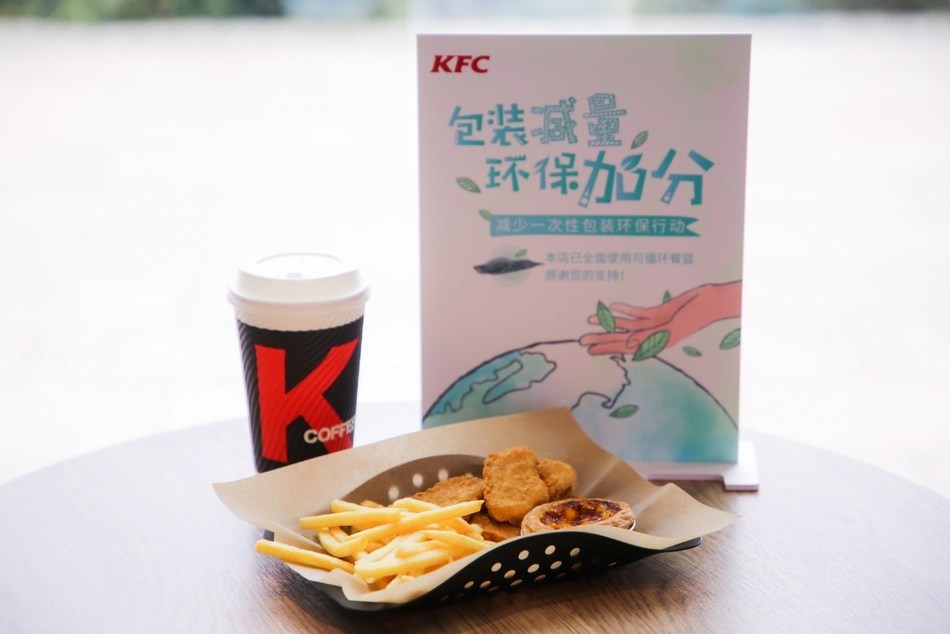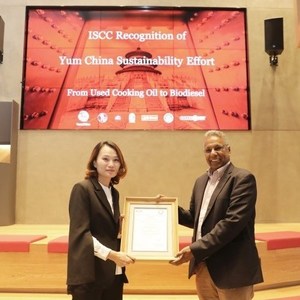Yum China receives ISCC certification for its used cooking oil



Photo: Yum China Holdings Inc.
May 15, 2019
BY Yum China Holdings Inc.
Yum China Holdings Inc. announced May 13 that it is the first restaurant company in China to get the International Sustainability and Carbon Certification for its used cooking oil that will be converted into sustainable biodiesel following a successful pilot project in Chengdu. Meanwhile, the company has also successfully rolled out its in-house developed reusable serving baskets in more than 6,000 KFC restaurants across China.
“We are very proud to be the first restaurant company in China to supply its ISCC-certified used cooking oil as a sustainable feedstock for biodiesel production,” said Joey Wat, CEO of Yum China. “The pilot biodiesel conversion project and the introduction of the reusable serving baskets in our KFC restaurants underlines our commitment to improving sustainability throughout our value chain while making a greater positive impact on society and the environment. We will continue to leverage our strengths and scale to play a greater role in helping build a sustainable future for our planet, and we will encourage our people, partners and the communities we operate in, as well as the millions of customers we serve, to contribute as well. Guided by our principles of ‘reduce, reuse, recycle and replace,’ we strive to explore innovative opportunities and leverage new technologies to build sustainable and environmentally friendly restaurants."
Yum China launched its first biodiesel conversion pilot project in Chengdu in October to ensure that all used cooking oil at company-owned KFC restaurants in the city is successfully converted into biodiesel. In accordance with the ISCC certification process, Yum China has established a comprehensive data recording and tracking system with local partners covering those KFC restaurants, waste collection companies, used oil storage sites and biodiesel plants. The system records information concerning used oil at every stage of the conversion process. In the future, Yum China plans to selectively roll out the biodiesel conversion initiative nationwide.
As one of Yum China’s sustainable packaging initiatives, the KFC reusable serving basket is designed to reduce and replace the use of disposable paper packaging without compromising customers’ in-store dining experience. The reusable serving basket has already replaced more than 10 types of disposable paper packaging for fries, chicken products and snacks.
Advertisement
After initial testing in October, the reusable serving basket was introduced in more than 6,000 KFC restaurants nationwide in February. As a result, KFC restaurants across the country are expected to save more than 2,000 tons of paper per year and the total amount of waste in restaurants is expected to be reduced on average by approximately 20 percent.
These pioneering new initiatives, among others, are contributing to Yum China’s overarching sustainability strategy to create a responsible ecosystem (CARE) with a focus on building sustainable restaurants, improving sustainability across the entire supply chain and promoting sustainability in communities. The company has integrated sustainability with its long-term business growth strategy “Sustainable Platform for Growth” and will continuously leverage its strengths to provide customers with safe and nutritious food in a way that is economically, socially and environmentally sustainable. Yum China has also created a roadmap of commitments to implement this strategy, which clearly defines the objective and goals for critical environmental and social focus areas.
Advertisement
Related Stories
The USDA maintained its outlook for 2025-’26 soybean oil use in biofuel production in its latest World Agricultural Supply and Demand Estimates report, released Aug. 12. The forecast for soybean oil prices was also unchanged.
U.S. soybean production for 2025 is forecast at 4.29 billion bushels, down 2% when compared to last year, according to the USDA National Agricultural Statistics Service’s latest monthly Crop Production report, released Aug. 12.
California’s new specified source feedstock attestation requirement: A critical new compliance step for renewable fuel producers
As of July 2025, California’s SCFS requires renewable fuel producers using specified source feedstocks to secure attestation letters reaching back to the point of origin. This marks a significant shift in compliance expectations.
At the University of Missouri, plant biochemist Jay Thelen is using arabidopsis as a powerful model to explore ways to boost oil production — an important step toward creating more sustainable, plant-based energy sources.
Iowa farmers have a new market opportunity for their 2025 soybean crop. Landus is expanding its Clean Fuel Regulation initiative, made possible by recent policy changes expected to increase Canada's demand for liquid biofuel.
Upcoming Events










